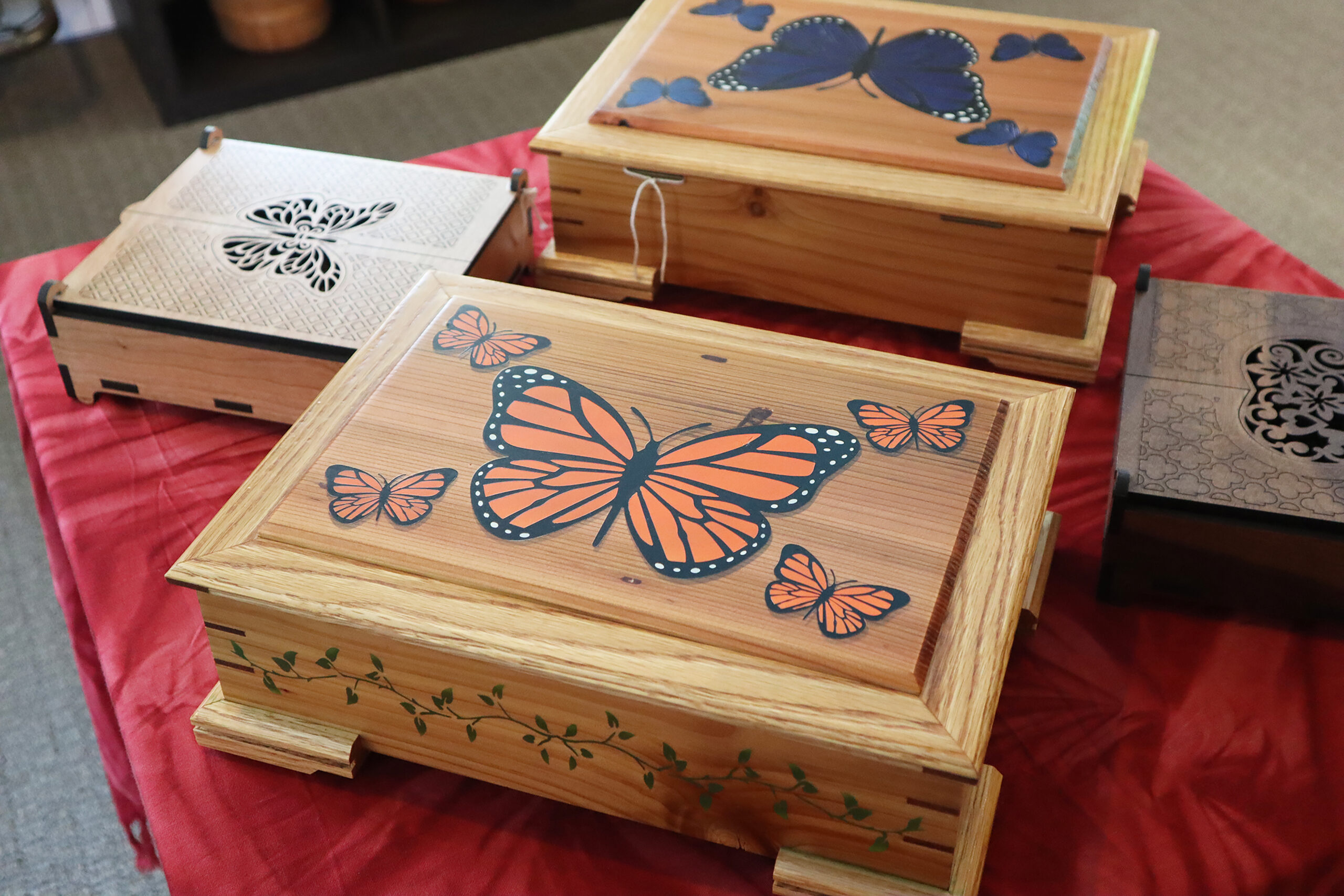Maybe it was magic.
Two weeks ago, I brought you the story of how mail from an unconventional Topeka ministry and a shop associated with it had been censored at Kansas prisons. Now, the ban on correspondence from the business — the Enchanted Willow on Southwest Gage Boulevard — has been lifted by officials at the Kansas Department of Corrections.
In a letter to the shop, the KDOC said its correspondence appeared to have been “inadvertently” censored.
“After speaking with the Chaplain the censors were rescinded and the letters were delivered to the residents,” Corrections Manager Darcie Holthaus wrote Debra Jackson, an associate sales partner at the Enchanted Willow, which sells New Age and Wiccan supplies. “We apologize for the oversight by our staff and wish to ensure you that corrective measures have been taken. We appreciate hearing from you in regard to this matter and being given the opportunity to correct a grievance.”
The letter was dated Sept. 27 — the day after I contacted the KDOC about the censorship.
When asked recently to confirm the ban on the shop had been lifted, the KDOC had no comment other than to refer me to the short statement the department had issued in response to my original inquiry.
“The residents of Kansas Correctional Facilities have a Constitutional right to practice the religion of their choice,” Randall Bowman, executive director of public affairs, said in an email. “The (KDOC) makes every effort to support residents’ rights to practice their religion. The safety and security steps implemented by the KDOC regarding this organization do not infringe upon that right.”
My interest in the prison censorship was sparked by an email to the Reflector from Robert Miller, a Wiccan who runs a prison ministry associated with Moonshadow Coven in Topeka. Miller is also a part-owner of the Enchanted Willow. In an interview, Miller told me that he considered the censorship an act of religious discrimination.
Despite having operated his ministry for 20 years and having corresponded with prisoners across the United States, this summer Miller began receiving notices from the Kansas Department of Corrections that his mail to its facilities was being censored. After protesting the ban, the KDOC told Miller he and his ministry were considered a “threat to institutional safety, order or security.”
While the ban on correspondence from the Enchanted Willow has been lifted, the censorship of Miller and Moonshadow Coven appears to remain in effect. The KDOC has declined to provide additional details or explain why Miller and his ministry were considered a threat to Kansas prisons.
I don’t know why the KDOC is so quick to censor prisoner mail and so slow in providing answers, but I suspect it has to do with officials attempting not to fall on the slippery slope of unequal treatment. How much easier it must be to ban a widely misunderstood religion like Wicca, a pagan earth-centered practice that has approximately zero influence in state politics, as opposed to an evangelical Christian ministry.
“I have not attempted (since) to write a letter to any of my friends in any facility,” Miller said. “I’m not sure if I should. I’m a little gun shy and doubt that my correspondence would get through.”

‘Unnecessarily restrictive’
Earlier this year, the KDOC adopted a statewide policy of scanning prison mail and giving the recipients the copy instead of the original. Kansas is one of more than a dozen states that have adopted mail scanning, and officials say it’s meant to prevent drugs from being sent to prisoners through the mail. Critics, however, say the practice eliminates a vital link for prisoners to friends and family outside.
“We’ve had general concerns about their entire mail process,” Esmie Tseng, communications director for the American Civil Liberties Union of Kansas, told me. “They copy the mail and sort of farm it out to be scanned into the system. So the prisoner who receives the mail actually just gets a copy. So you’re talking about in some cases private documents like a kid’s hand-drawn birthday card or some other kind of picture. That’s just unnecessarily restrictive.”
Tseng said the ACLU of Kansas was also concerned about prisoner access to religious and political material. While the organization was not involved in the Enchanted Willow or Moonshadow Coven cases, it had in the past communicated with the KDOC and had tried to work with the department to resolve these concerns.
“We’ve definitely had concerns about First Amendment rights,” Tseng said, “in terms of not only political content, but also religious content that prisoners haven’t been able to get. There doesn’t appear to be any real reason for the prisons to censor these materials.”
But, she said, the KDOC does appear to target literature from faiths other than Christianity.
“These are people who are clearly turning to something,” she said, “to develop themselves and rise above their circumstances and be something more than they were before, and KDOC policy is inhibiting that in a way that seems counterproductive to rehabilitating people.”
In Kansas, Tseng said, there was a “heavy-handed, restrictive approach” to incarceration that resulted in taking things away from people who have already had most things taken away.
“It’s deeply concerning that you have a state that is more than willing to lock up as many people as possible and to have some of the harshest criminal sentencing (guidelines) in the country,” she said. “But then, once you’re in prison, they’re directly trying to undermine any efforts that you’re making to improve yourself.”

What’s in a name?
While the prisons have a legitimate interest in maintaining safe and secure facilities, that interest can be so poorly defined in internal policies and procedures that it invites First Amendment abuses. While it might not seem to matter much if a prisoner in Lansing or any other facility is denied access to a Wiccan ministry or the ability to purchase from a shop specializing in New Age merchandise, it’s central to the question of the role prisons play in our society. How we treat the incarcerated is a reflection of our own values, or at least the values of those who are elected to represent us.
Even the language we use to discuss the issue is fraught.
How do you refer to an incarcerated person? “Convict” is at the harsh end of the scale and carries with it B-movie stereotypes. Same with “felon.” As a journalist, I’ve used “inmate” frequently, but Tseng said the ACLU and other groups are urging more neutral language. She said she found “prisoner” accurate, but would prefer descriptions that refer to incarcerated people or individuals. The Marshall Project, a national nonprofit that reports on the criminal justice system, has asked reporters and editors to consider avoiding labels that dehumanize the incarcerated. The KDOC refers to its prisoners as “residents,” a term that Tseng said makes her want to roll her eyes.
“It’s just a cheap euphemism,” she said.
The disconnect between language and reality is just one of the barriers preventing meaningful communication between the KDOC and the public. Another is the department’s unwillingness to provide convincing evidence of the need to censor mail from Miller, who runs the Wicca prison ministry, and others. Prisoners and their families are being increasingly separated by policies that make telephone and electronic communication expensive. The move to mail scanning must seem a final indignity to the incarcerated and their families.
The draconian mail scanning and censorship policies in state prisons is a problem that every Kansan should be concerned about, because it’s being done in our name. Nelson Mandela said that nobody truly knows a nation until they’ve been locked inside its jails. Never mind what lawmakers might say about the good-hearted nature of Kansans, our collective conscience — or lack of it — is to be found in how we treat the incarcerated.
Those incarcerated in Kansas facilities are already bodily imprisoned by the state. Their minds shouldn’t be locked away as well.
Max McCoy is an award-winning author and journalist. Through its opinion section, the Kansas Reflector works to amplify the voices of people who are affected by public policies or excluded from public debate. Find information, including how to submit your own commentary, here.
This post was originally published on this site be sure to check out more of their content.









